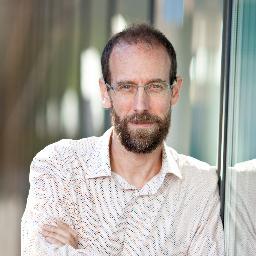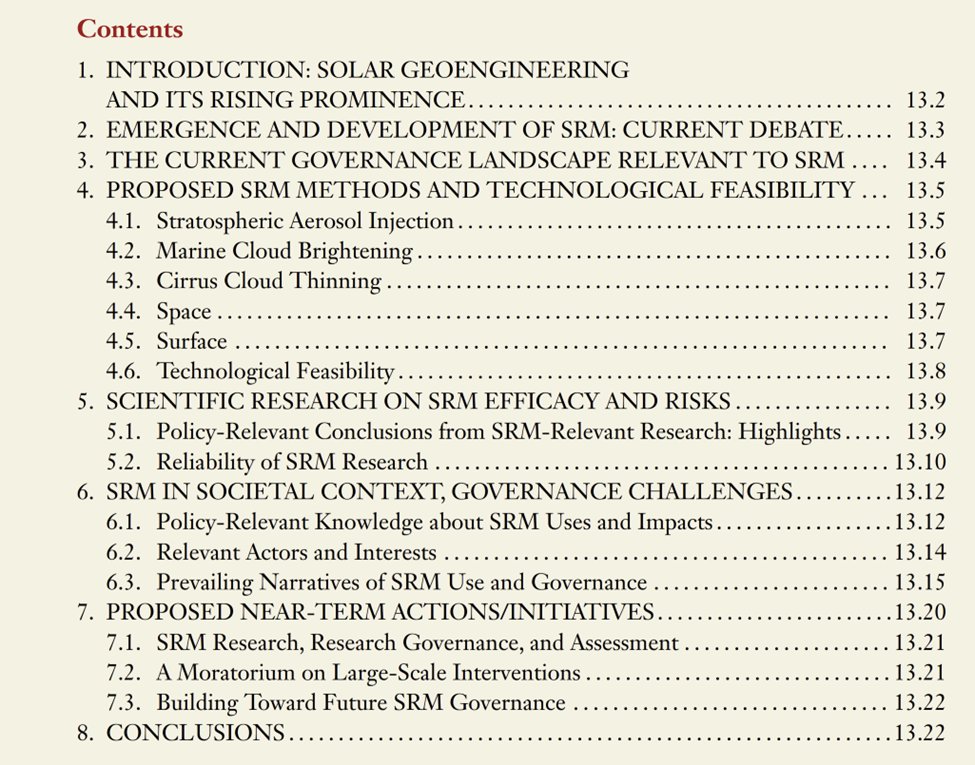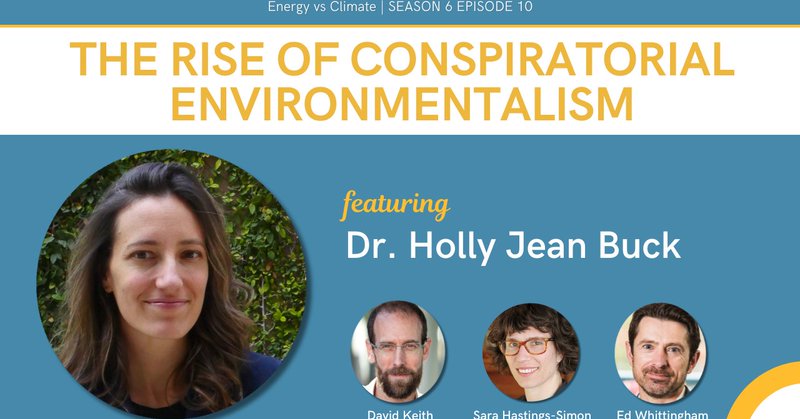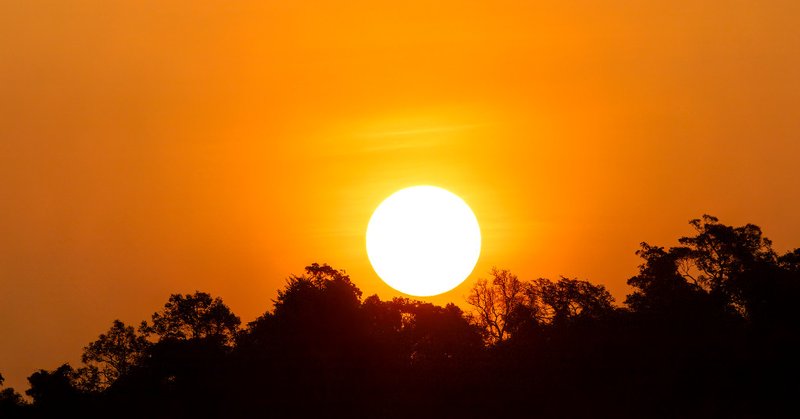
David Keith
@DKeithClimate
Followers
10K
Following
915
Media
567
Statuses
3K
Climate science and technology policy since 1989. Building Climate Systems Engineering @UChicago. Founded Carbon Engineering. Bluesky: @davidkeith.bsky.social
2/3 Chicago & 1/3 Canmore
Joined September 2015
New paper: "Solar Geoengineering: History, Methods, Governance, Prospects" by @parson_ted & me in Annual Reviews. Full text at: I am particularly proud of this paper. This thread provides some highlights:.1/8
22
17
46
@DegreesNGO @hollyjeanbuck @MutisoRose And Holly Buck is a powerful writer on geoengineering. See her book "After Geoengineering." Also, her article "The Rise of Green MAGA" is essential reading for the current political environment: Here's Holly on our pod:
energyvsclimate.com
Conspiratorial-environmentalism’s connection to climate and geoengineering; the anti-vax movement; and what it tells us about mainstream environmentalism and climate politics. David and Ed chat with...
2
1
1
@DegreesNGO @hollyjeanbuck @MutisoRose Rose Mutiso is a great rising voice in the climate and energy space, and I recently spoke with her about the energy transition in Africa on my Energy vs Climate podcast: Rose's Ted Talk on the subject is also a must watch:
2
0
1
@DegreesNGO @hollyjeanbuck @MutisoRose The conversation focused on SRM in context, alongside carbon removal, adaptation, and emissions cuts. We need to evaluate how they might work together in our messy world, a topic that's on my mind every day as I write a book that tackles this question.
1
0
1
Enjoyed Cape Town last month at the @DegreesNGO Forum 2025. I had the pleasure of joining @hollyjeanbuck and @MutisoRose for a plenary session on how sunlight reflection methods (SRM) fit into the broader climate response toolbox. #DGF2025
3
6
11
@LisaD144 @EnvDefenseFund @CanAccelerator @DougMacMartin Canada can’t just sit on the sidelines regarding SRM research and governance. Ignoring SRM means others will make the decisions. Here’s an old op-ed Ted Parson and I wrote for the Globe & Mail that makes this point:. (not our headline).
davidkeith.earth
At the time of this post, David Keith was a professor in Harvard's Schools of Engineering and of Public Policy, and founder at Carbon Engineering. Edward Parson is professor and co-director of the...
2
3
2
@LisaD144 @EnvDefenseFund @CanAccelerator @DougMacMartin Lisa Dilling (@LisaD144) leads SRM research at the Environmental Defense Fund and has written about the need to explore the potential impacts of SRM before any sort of deployment is considered: .
blogs.edf.org
The impacts from climate change will continue to escalate in the years ahead, and a growing number of scientists, philanthropies and companies have become interested in strategies to lower global...
3
0
2
@LisaD144 @EnvDefenseFund @CanAccelerator This conversation grew out of meetings that several Canadian SRM leaders, including Ted Parson and @DougMacMartin, had with Canadian government officials and NGOs about a possible SRM research program in Canada.
1
0
1
Can Canada afford to ignore sunlight reflection methods (SRM)? I’m joining @LisaD144 from the @EnvDefenseFund for a discussion hosted by The Transition Accelerator (@CanAccelerator), a major Canadian NGO focused on the climate. June 10, 12pm ET. Join:
transitionaccelerator.ca
Should Canada act now to build its SRM research capacity and leadership? How can we foster the local expertise and international partnerships we’ll need to control the technology should solar...
2
4
4
Superb op-ed from Steven Pinker (@sapinker on X) calling out the right's absurd Harvard Derangement Syndrome. Harvard has some woke, but its peak has passed, and claims of many on the right are disconnected from the reality I saw as a faculty member.
2
0
10
@bodanskydm See, the concluding section of the article, "If not a negotiated moratorium, then what?” for practical thinking on how governance can move forward without halting research progress.
0
0
1
@bodanskydm States can begin research programs while making it clear that deployment is premature. This allows for bottom-up norm setting and transparency without the risks of a negotiated moratorium.
1
0
1
@bodanskydm Many people, including (sometimes) me, have argued that a moratorium could provide a safe space under which research can flourish. But a moratorium would not magically create research. And as Sue and Dan point out, there are many ways in which a moratorium might inhibit research.
1
0
1
Smart argument against a moratorium for deployment of sunlight reflection SRM, from Sue Biniaz (former top US climate negotiator) and @bodanskydm (environmental lawyer).
justsecurity.org
A bottom-up norm-setting approach would rectify the concerns of agreeing to a global moratorium on solar radiation management deployment.
1
3
4
New high-quality survey on public attitudes toward sunlight reflection in Great Britain:. 16% support SAI deployment. 46% are unsure. Younger people are more supportive overall. Interesting signals on awareness and openness to geoengineering in general.
yougov.co.uk
Most Britons say a drastic change in the steps taken to combat climate change is needed in order to avert its worst effects
3
4
8
Our UChicago program is supporting Edwin's @edwinkite's research on sunlight reflection that also explores analogs between geoengineering on Earth and terraforming on Mars.
climateengineering.uchicago.edu
For decades, insights from planetary aerosol research have pollinated geoscience research with ideas that carry significant societal relevance. Examples include how data from Mars dust storms helped...
0
1
3
Is Global Cooperation on Climate Change Possible? An interesting conversation with Fmr. Foreign Minister of Pakistan @HinaRKhar, fmr. lead US climate negotiator Sue Biniaz, and fmr. climate advisor to Trump George Banks, moderated by @AmyAHarder.
0
2
5










